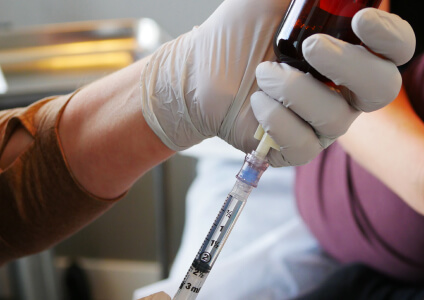Trigger Point Injection Therapy

Trigger points, or “knots”, are palpable nodules that develop within a taut band of skeletal muscle/fascia. When compressed they cause significant tenderness, referred pain (pain felt elsewhere), and muscle twitching.
There are many theories about why they form, though there is not great research backing these theories. Some causes are associated with injuries, muscle overuse, lack of exercise, hypermobility, and stress.
Most of the general population has or will experience trigger points, but they are not always an issue.
However, when they getting in the way of life, they can cause significant discomfort and lead to an array of dysfunction and chronic pain. That’s where we can help.
Trigger-Point Concerns:
The pain experienced from directly pressing on a trigger point is often felt some distance away from it, however, there can be general achiness and stiffness that spreads out around it.
When not treated and/or the body is stuck in a pattern (ie., slouching at a computer all day), it can turn into a chronic problem for some. When there are multiple severe trigger points, it can turn into a disabling condition known as myofascial pain syndrome.
Trigger points can and do co-exist with many other kinds of painful conditions. Two other common conditions associated with trigger points are hypermobility syndromes (such as hypermobility-type Ehlers-Danlos syndrome or hEDS) and fibromyaglia.
If you have tried/are trying conservative measures such as heat therapy, massage therapy, myofascial release, PT and are not finding any, relief injection may be the next step.
Trigger-Point Injections:
One of the services offered at NFM Health, Inc. by Dr. Sabin Gilman is trigger-point injections. This typically involves using a needle to rhythmically inject a formula (it varies, but can be procaine/lidocaine, saline and sometimes 5% dextrose) directly into the trigger point.
The goals are to release the trigger point, free up normal movement, improve blood flow to the area, and reduce pain.
Risk/Contraindications:
It is not a therapy for everyone or every trigger point. Risks will be discussed in detail with each patient; contraindications, which can be case dependent, will also be discussed. Some examples are pregnancy, uncontrolled diabetes, infection, skin infections, etc.
Procaine Contraindications: pseudocholinesterase deficiency, pregnancy, myasthenia gravis, lupus.
What to Expect:
The first appointment will typically involve obtaining a solid medical history for a patient, assessing areas of concern, identifying trigger points, reviewing contradictions, risks, benefits, and developing a plan.
Depending on various factors, the trigger point(s) may or may not be injected until the second visit. There may be some stinging, discomfort, numbness, and bruising associated with the injections.
Some patients may notice an immediate effect, but it may take up to 2-3 injections in the same TP to improve pain. Multiple injections should be spread out over 1-2 weeks. The general limit is 2-3 areas in 1 session.
Price/Insurance:
Trigger-point injections are a separate charge outside of the visit cost. Some insurances cover them, but many do not. If you would like to submit it to your insurance, please ask for a superbill. I do bill them for the visit portion. The cost is dependent on the time it takes for the actual procedure and it is $60 for up to 15 minutes, $100 for 16-30 minutes, and $150 for 31-60 minutes.
If you would like to check with your insurance plan prior to the appointment, the codes for trigger points are: 20552 or 20553.
Schedule Your Appointment Today
Our Locations:
Donec id elit non mi porta gravida at eget metus. Nullam id dolor id nibh ultricies vehicula ut id elit. Aenean lacinia bibendum nulla sed consectetur. Maecenas sed diam eget risus varius blandit sit amet non magna.
Receive health tips, insightful articles, and our latest updates by joining the list.
